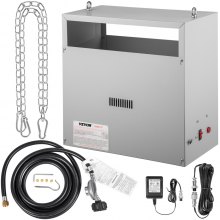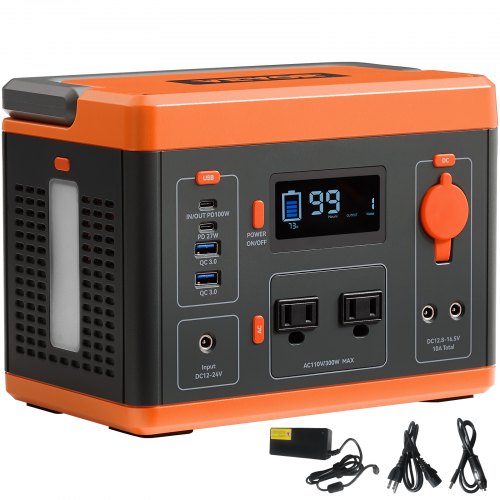












Discover the unparalleled combination of affordability and quality with VEVOR's latest range of portable generators. Designed for reliability and efficiency, these generators are the perfect companion for outdoor enthusiasts, homeowners seeking emergency power solutions, and professionals in need of a dependable power source on the go. Each VEVOR portable generator boasts advanced features such as low fuel consumption, quiet operation, and easy portability, ensuring you have power whenever and wherever you need it. With a robust build and precision-engineering, these generators guarantee peak performance and longevity, making them a smart investment for anyone who refuses to compromise on quality or value. Ideal for camping trips, power outages, and outdoor events, VEVOR's portable generators provide the power you need without breaking the bank. Don't let power disruptions disrupt your lifestyle or work. Choose VEVOR for a seamless and uninterrupted power supply. Act now to experience the blend of innovation and affordability that only VEVOR can offer. Power your world with VEVOR portable generators – where excellence meets affordability.
Portable generators are versatile power sources that provide electricity on the go, making them indispensable in various situations, from outdoor adventures to emergency backup power. These compact and portable devices are designed to deliver reliable electricity for powering appliances, tools, electronics, and more in locations where grid power is unavailable or unreliable. In this guide, we'll delve into the world of portable generators, understanding their types, features, applications, and important considerations for selecting the right generator for your needs.
Portable generators come in several types, each with its own unique features and benefits:
Conventional portable generators, also known as open-frame generators, are the most common type of portable generator. They feature a conventional design with an open frame and are powered by gasoline or diesel fuel. These generators are versatile, affordable, and suitable for a wide range of applications, from camping and tailgating to job sites and home backup power.
Inverter portable generators utilize advanced inverter technology to produce clean and stable power suitable for sensitive electronics such as laptops, smartphones, and televisions. They are quieter, more fuel-efficient, and produce less noise and emissions compared to conventional generators, making them ideal for camping, RVing, and other recreational activities.
Dual-fuel portable generators offer the flexibility to run on either gasoline or propane, providing users with options for fuel availability and storage. These generators are convenient for emergency preparedness and outdoor activities where fuel versatility is essential.
Consider the wattage capacity of the portable generator to ensure it can handle the power requirements of your appliances, tools, and electronics. Calculate the total wattage needed and choose a generator with sufficient rated and surge power output to accommodate peak loads.
Look for portable generators with compact and lightweight designs, ergonomic handles, and durable wheels for easy transportation and maneuverability. Consider factors such as size, weight, and portability features when selecting a generator for your specific application and usage scenarios.
Evaluate the runtime and fuel efficiency of the portable generator to determine how long it can operate on a single tank of fuel. Choose a generator with a fuel-efficient engine, large fuel tank capacity, and eco-mode or smart throttle feature to maximize runtime and reduce fuel consumption.
Portable generators have a wide range of applications across various industries, sectors, and activities, including:
Choose a portable generator with low noise levels to minimize disturbance to yourself and others, especially in quiet outdoor settings or residential areas. Look for generators with sound-dampening features, mufflers, and quiet operation modes for noise-sensitive applications.
Consider the environmental impact of the portable generator, including emissions of pollutants such as carbon monoxide (CO), nitrogen oxides (NOx), and hydrocarbons. Opt for generators with low-emission engines, EPA or CARB certification, and eco-friendly features to reduce air pollution and comply with environmental regulations.
Prioritize safety when selecting a portable generator, especially for home use and indoor applications. Look for generators with safety features such as automatic low-oil shutdown, overload protection, GFCI outlets, and carbon monoxide detectors to prevent accidents, electrical hazards, and engine damage.
In conclusion, portable generators are indispensable power sources that provide electricity on the go, enabling outdoor adventures, emergency preparedness, and remote power solutions. By understanding the types, features, applications, and important considerations for selecting portable generators, you can choose the right generator to meet your power needs and lifestyle preferences. Whether camping in the wilderness, working at a job site, or preparing for unexpected power outages, portable generators offer reliable and convenient power when and where you need it most. So empower your adventures and stay prepared for any situation with a versatile and dependable portable generator by your side!
Portable generators are versatile devices primarily used to provide temporary power in situations where regular electricity is unavailable or inaccessible. They're commonly used during power outages, outdoor activities like camping or tailgating, construction sites, and events where access to power sources may be limited.
Portable generators work by converting mechanical energy, typically from a gasoline, diesel, or propane engine, into electrical energy. This energy is generated through a process involving an alternator and a fuel source. The alternator spins within a magnetic field, producing an electrical current. This current is then routed through outlets on the generator, providing power to connected devices and appliances.
When selecting a portable generator, several factors should be considered to ensure it meets your needs. These factors include the power output or wattage capacity, fuel type and efficiency, runtime on a single tank of fuel, noise level, portability features such as handles and wheels, safety features like overload protection, and additional features such as electric start or remote monitoring capabilities. Assessing your power requirements and intended usage will help determine the most suitable generator for your needs.
No, portable generators should never be operated indoors, including inside homes, garages, or enclosed spaces. Generators emit toxic carbon monoxide gas during operation, which can quickly accumulate in enclosed areas and pose a serious risk of carbon monoxide poisoning. Always place portable generators outdoors in a well-ventilated area, away from doors, windows, and vents where exhaust fumes could enter living spaces. Additionally, be sure to follow all safety guidelines provided by the manufacturer to minimize risks associated with generator operation.
Proper maintenance is essential to ensure the reliable performance and longevity of a portable generator. Maintenance tasks may include regular oil changes, fuel system maintenance, cleaning or replacing air filters, inspecting and tightening connections, testing the generator periodically, and storing it properly when not in use. Refer to the manufacturer's instructions and recommended maintenance schedule for specific guidance on caring for your portable generator. Regular maintenance helps prevent breakdowns and ensures your generator is ready to provide power when needed.